Newsletter 12 Feb 2024
Environment: What’s Up in GENeva | 12 – 18 February 2024

The Geneva Environment Network’s weekly newsletter includes the latest information on the global environmental agenda, main events, job vacancies, learning opportunities, as well as other useful resources and updates. Stay tuned and follow us on X (Twitter), Facebook, LinkedIn, Instagram, and Youtube, or visit our website regularly for additional updates.
Image of the week | The Geneva Environment Network organized last week an information-sharing session on environment and human rights-related activities in the upcoming 55th session of the Human Rights Council (HRC 55). With the right to a clean, healthy, and sustainable environment as the usual main environmental theme of the Council’s March session, participants discussed and shared information on their activities and concerns about the upcoming session. © Enora Kerjean, UNEP/GEN, 8 February 2024
Record-breaking Climate and Extreme Weather Events
Last week, the World Meteorological Organization (WMO) alerted that the EU Copernicus Climate Change Service confirmed the record-breaking trend seen for much of 2023 has continued in 2024, with January being the hottest January on record. January 2024 — the eighth month in a row to be warmest on record for the respective month of the year — has been characterized by extremes, with regions facing either drier-than-average or wetter-than-average conditions. WMO also highlighted that it is likely that the warming effect of the current El Niño episode will intensify the heat even more during 2024, causing more extreme weather events.
Meanwhile, wildfires have devastated swaths of central and northern parts of Chile and caused over a hundred casualties, making it the country’s deadliest wildfire since record-keeping began in 1900. The fires come as many countries in South America – including Chile, Argentina, Paraguay, and Colombia – see persistent heatwaves and droughts, fueled by El Niño. These episodes led the United Nations Office for Disaster Risk Reduction (UNDRR) to stress that countries must invest in fire prevention, including in preparedness and early warning systems that are multi-hazard and cover everyone.
Other relevant news include:
- A new study published last week by van Westen et al., from the Institute for Marine and Atmospheric Research of Utrecht University, in Science Advances suggests the Atlantic overturning circulation (AMOC) “is on tipping course”. The new study found that AMOC can potentially collapse because of the input of fresh water in the North Atlantic. Hence, the study highlights that there is a need for a more physics-based, observable, and reliable early warning indicator that characterizes the AMOC tipping point. According to scientists, the paper adds more weight to recent warnings, such as the 2022 OECD Climate Tipping Points report and the 2023 Global Tipping Points report, referring to at least 3 independent studies, using observed data sets and different methods, finding warning signals for AMOC approaching a tipping point.
- What to do when you’re completely overwhelmed by climate anxiety | Allie Volpe | Vox | 8 February 2024
To help walk the line between staying in touch with reality and not succumbing to despair, climate-aware therapists offer their advice, from accepting nuance to finding strength in community. - Commission presents recommendation for 2040 emissions reduction target to set the path to climate neutrality in 2050 | European Commission | 6 February
The Commission’s detailed impact assessment on possible pathways to reach the agreed goal of making the European Union climate neutral by 2050 recommends a 90% net greenhouse gas emissions reduction by 2040 compared to 1990 levels, launching a discussion with all stakeholders.
- UNITAR and UPEACE are hosting the webinar Post COP28 dialogue: Women’s Empowerment in Climate Change Negotiations on 15 February.
All Levels of Governance Working Towards a Plastics Treaty
On the road to the fourth session of the Intergovernmental Negotiating Committee to develop an international legally binding instrument on plastic pollution (INC-4), taking place from 23 to 29 April 2024 in Ottawa, Canada, discussions continue unpacking the options of the Revised draft text of the international legally binding instrument on plastic pollution, including in the marine environment (UNEP/PP/INC.4/3) and developing propositions to strength the agreement. This week, the Global Cities Hub will host an event to emphasize the role of local and regional governments (LRGs) in the negotiations, and the necessity to refer to LRGs in the text itself. During the event, the GCH will introduce the idea of a soft coalition on LRGs to mobilize during the negotiation process and beyond. → Register on Zoom to attend the event on Thursday 15 February 2024 from 14:00 to 15:00 CET.
Recent news on ending plastic pollution include:
- Opinion: Why is India weakening the Global Plastics Treaty? | Satyarupa Shekhar | The Third Pole | 8 February 2024
India’s submissions to the UNEP Secretariat reflect a perpetuation of a narrative that prioritises corporate profits and economic considerations over environmental sustainability and public health. One of the primary arguments raised by India pertains to the perceived conflict between the proposed treaty’s provisions and World Trade Organization rules.
- The Brand Audit 2023 Report | BreakFreeFromPlastic | 7 February 2024
Break Free From Plastic Movement unveils 2023 Global Brand Audit results, with The Coca-Cola Company once again claiming the title of top global plastic polluter – meaning its products were found polluting the countries with the most waste.
- The beginning of the end for plastics pollution? | UNDP | 6 February 2024
As we work on a global plastic pollution agreement it’s critical for everyone to commit to this important journey. It’s not easy to balance the different views and priorities of countries, industries, and groups, but all are encouraged to approach the challenge with optimism. - The plastic homes of hermit crabs in the Anthropocene | Zuzanna Jagiello, Łukasz Dylewski, Marta Szulkin | Science of the Total Environment | February 2024
Plastic is the most pervasive element of marine waste, with a harmful impact on wildlife. By using iEcology (i.e., internet Ecology, use of online data sources as a new tool in ecological research), the study reports the emergence of a novel behaviour in hermit crabs related to the use of plastic or other anthropogenic materials.
Advancing the Environment and Human Rights Agenda
Strengthening the links between the environment and human rights remains high on the agenda of International Geneva as various events advancing these connections take place this week:
- With the 55th session of the Human Rights Council (HRC 55) taking place soon from 26 February to 5 April 2024 in Geneva and online, the Organizational meeting for the upcoming session is taking place on 12 February 2024, from 15:00 – 18:00 CET at Palais des Nations. → An overview of key environmental issues at HRC55, side events, and further resources are available on our HRC55 and the environment-dedicated webpage.
- The Office of the High Commissioner for Human Rights (OHCHR) is holding an informal consultation regarding Human Rights Council resolution 53/6 (“Human rights and climate change”), whereby the Council requested the Secretary-General to conduct an analytical study on the impact of loss and damage from the adverse effects of climate change on the full enjoyment of human rights, exploring equity-based approaches and solutions to addressing the same. The informal consultation will be held virtually with two identical sessions to accommodate different timezones on 12 February 2024, 17:00 – 18:30 CET, and on 13 February, 10:00 – 11:30 CET. → More information on the forthcoming study.
GEF Adopts Investments to Tackle the Triple Planetary Crisis
The 66th meeting of the Global Environment Facility (GEF) Council — its chief governing body — met with a packed agenda last week, in Washington DC, and agreed to invest $1.1 billion to tackle the triple planetary crisis. The Council also met as the Council for the Least Developed Countries Fund (LDCF) and Special Climate Change Funds (SCCF). This session sat for the first time as the Council for the Global Biodiversity Framework Fund (GBFF), the special fund created to support the implementation of the Kunming-Montreal Global Biodiversity Framework (GBF), and completed the work needed to make it operational in the upcoming weeks.
Read more on the outcomes:
- GEF Council approves $1.1 billion and sets plans for biodiversity fund | GEF | 9 February 2024
- Coverage of the 66th Meeting of the GEF Council | Earth Negotiations Bulletin | 5-9 February 2024
Parties to Convention on Migratory Species Meet with Contributions from International Geneva
The 14th session of the Conference of the Parties to the Convention on the Conservation of Migratory Species of Wild Animals (CMS COP14) is taking place this week in Samarkand, Uzbekistan. Under the slogan, “Nature knows no borders”, CMS COP14 gathers governments, scientists, and stakeholders to agree on strategies for the conservation of migratory species and their habitats. The session, preceded by the High-Level Segment on Sunday 11 February, will include the release of various publications, including the State of the World Migratory Species.
This meeting is an important global biodiversity gathering since the adoption of the Kunming-Montreal Global Biodiversity Framework in December 2022, and will address a wide range of important conservation priorities and new initiatives, including many that will support the implementation of the GBF. Institutions from Internationa Geneva including IUCN, the Secretariats of Convention on Wetlands, CITES, UNECE, and UNEP Europe Office will actively participate. → Consult the official website for more information and follow the IISD Earth Negotiations Bulletin for live updates.
Upcoming Deadlines Related to the Environment
With the environment high on the agenda of International Geneva and beyond, different international processes, negotiations, and fora regularly call for inputs in preparation for future reports and guidelines, as well as contests. → Find here calls for submissions related to the environment and here information on ongoing environmental contests.
- The Secretariat of the Intergovernmental Science-Policy Platform on Biodiversity and Ecosystem Services (IPBES) invites members to submit additional suggestions for thematic or methodological issues related to biodiversity and climate change, which would benefit from collaboration between the Intergovernmental Panel on Climate Change (IPCC) and IPBES. The Executive Secretary will prepare a compilation of suggestions and will be made available for peer review. A proposal will be prepared and made available for consideration and further action by the Plenary at IPBES 11. Deadline for submissions is on 15 February 2024.
- IISD Trade + Sustainability Hub @ WTO MC13 | Abu Dhabi, UAE | Alongside the 13th WTO Ministerial Conference (MC13), the International Institute for Sustainable Development (IISD) Trade + Sustainability Hub taking place from 26 – 28 February 2024, brings together thought leaders from both within and outside governments for a series of conversations on the challenges of building cooperative trade policy that delivers for sustainable development. → Register to attend in person or online.
Green February Holidays
As the schools in Geneva and neighboring France will start the February holidays at the end of this week, and other neighboring regions might already be off this week, we invite you to check our Green Winter in Geneva 2023/2024 update. From self-guided educational outdoor activities to creative online workshops and tips for more environmentally-conscious holidays, learn more about the environment, encounter local wildlife, and explore nature trails for a “green” winter season in the region.
What (Else) to Read Next?
- Race to the bottom: can countries strike a second deal to reel in fisheries subsidies? | Michelle Langrand | Geneva Solutions | 11 February 2024
Two years after striking a historic trade deal to end subsidies driving a depletion of the ocean’s fish populations, countries are hammering out a second agreement to tie the loose ends. With just a few weeks before the World Trade Organization’s ministerial conference in Abu Dhabi, the pressure is on. As countries cling to their handouts and tax exemptions, conservation experts warn of a race to the bottom. - Geneva Academy Visiting Fellow, Dr Stavros Pantazopoulos will focus on the protection of the environment in armed conflict and the initiative to criminalize conflict-related environmental harm and the crime of ecocide | Geneva Academy | 9 February 2024
Dr. Pantazopoulos will focus his research on the protection of the environment in relation to armed conflicts (PERAC). It will address the initiative to criminalize conflict-related environmental harm, placing the emphasis on the crime of ecocide and explore international fora that have recently started to deal with various aspects of PERAC, such as the United Nations Environment Assembly. - Poverty, debt and climate risks: UNCTAD deputy urges stronger support for middle-income countries | UNCTAD | 8 February 2024
UNCTAD Deputy Secretary-General Pedro Manuel Moreno spotlighted on 6 February the challenges and potential of middle-income countries during a speech at a high-level conference in Rabat, Morocco. These nations lack the global support they need, despite being home to about 75% of the global population and 62% of the world’s poor and facing mounting debt and worsening climate vulnerabilities. - The end of the toxic tooth filling era in the EU | European Environmental Bureau | 8 February 2024
The European Union confirms its willingness to lead by example in tackling mercury pollution from dental amalgam, a substance also known as “silver-filling” due to its appearance. - Inside the high-tech effort to save the world’s dwindling sand reserves | UNEP | 6 February 2024
There is no global standard for the extraction of sand. Peduzzi is hopeful the Marine Sand Watch will help change that and spur a discussion on best practices. The platform is also designed to help developing nations bolster their ability to monitor the environment. - Geneva Policy Outlook 2024 |Republic and State of Geneva, the City of Geneva, the Fondation pour Genève, and Geneva Graduate Institute | 5 February 2024
As a finger on the pulse of Geneva’s global policy space, the Geneva Policy Outlook 2024 (GPO24) gathers a selection of articles aimed to stimulate reflection on and provide practical impulses for international cooperation and global governance. - 300 years of sclerosponge thermometry shows global warming has exceeded 1.5 °C | Malcolm T. McCulloch, Amos Winter, Clark E. Sherman & Julie A. Trotter | Nature Climate Change | 5 February 2024
Using 300 years of ocean mixed-layer temperature records preserved in sclerosponge carbonate skeletons the study demonstrates that industrial-era warming began in the mid-1860s, more than 80 years earlier than instrumental sea surface temperature records. […] Hotter land temperatures, together with the earlier onset of industrial-era warming, indicate that global warming was already 1.7 ± 0.1 °C above pre-industrial levels by 2020. The result is 0.5 °C higher than IPCC estimates, with 2 °C global warming projected by the late 2020s, nearly two decades earlier than expected. - Children’s rights and hazardous chemicals: Strengthening legislation in the EU | CRIN | 5 February 2024
Uncovers the links between hazardous chemicals and children’s rights violations in the EU and beyond, setting out how EU chemical laws fail to uphold children’s rights and inviting EU decision-makers to rethink how to better assess, regulate, and restrict those chemicals. The publication comes out alongside CRIN 2024 Manifesto. - La science peut-elle s’affranchir de l’écologie? Le projet du Futur collisionneur circulaire du CERN est-il raisonnable, à l’heure de la crise climatique et énergétique? | Tribune de Genève | 5 February 2024
«Le CERN peut-il tout se permettre?» Cette interrogation, c’est le titre d’une pétition qui tourne sur la Toile. Elle émane d’un collectif d’opposants au Futur collisionneur circulaire, le FCC. Sa réalisation, à l’horizon 2045, en est à l’étude de faisabilité.
Events
See all

Body Meeting
Joint FAO/WHO Expert Meeting on Microbiological Risk Assessment of Viruses in Foods | Prevention and Intervention Measures
12 – 16 Feb 2024
WHO Headquarters
FAO, WHO

Conference
Aluminium in Amazonia: A Socio-Environmental History of an Industrial Complex in a Peopled Biome (1915-Present)
12 Feb 2024 10:30 – 12:30
Maison de la paix | Pétale 2, Room S9 & Online | Webex
IHEID

Virtual
Environment, Climate, Conflict, and Peacebuilding (ECCP): Peace @ CBD Meeting
12 Feb 2024 15:00 – 16:00
Online | Zoom
Geneva Peacebuilding Platform

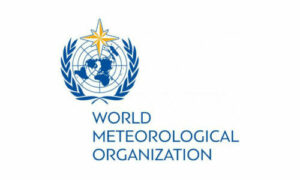
Body Meeting
Global expert meeting on climate-informed health surveillance and climate-informed HEWS
13 – 14 Feb 2024
WMO Headquarter & Online
WMO
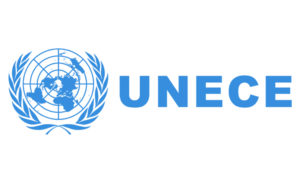
Body Meeting
2nd meeting of the Task Force for International Cooperation on Air Pollution
13 – 14 Feb 2024
Palais des Nations
UNECE Convention on Long-Range Transboundary Air Pollution
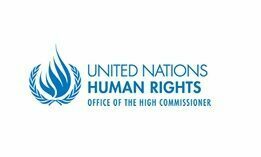
Virtual
OHCHR Informal Consultation | Secretary-General’s analytical study on the impact of loss and damage
13 Feb 2024 10:00 – 11:30
Online | MSTeams
OHCHR

Virtual
Environment, Climate, Conflict, and Peacebuilding (ECCP) | February Monthly Meeting
13 Feb 2024 14:00 – 15:00
Online | Zoom
Geneva Peacebuilding Platform

Virtual
IASC Briefing on Environmental Responsibility in Humanitarian Operations
13 Feb 2024 15:00 – 16:00
Online | Teams
OCHA

Virtual
Report Presentation | South Asia Development Update: Towards Faster, Cleaner Growth
14 Feb 2024 15:00 – 16:30
Online | Webex
World Bank
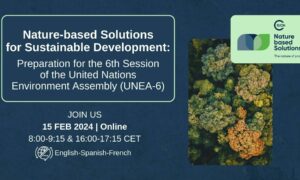
Virtual
Nature-based Solutions for Sustainable Development: Preparation for the 6th Session of the United Nations Environment Assembly
15 Feb 2024
Online | Zoom
IUCN

Virtual
Navigating a sutainable blue economy: Target-setting for financial institutions
15 Feb 2024 11:00 – 17:00
Online | BrightTalk
UNEP FI
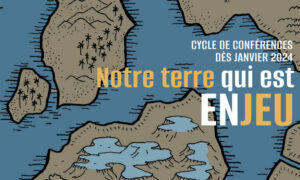
Local
Reflections on our Use and Abuse of Water | Cycle “Notre Terre qui est enjeu”
15 Feb 2024 12:30 – 14:00
Société de Lecture
Société de Lecture

Virtual
Plastic Pollution Treaty & Cities: How to Participate in the Process
15 Feb 2024 14:00 – 15:00
Online | Zoom
Global Cities Hub - Geneva, ICLEI
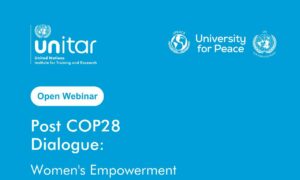
Virtual
Post COP28 dialogue: Women’s Empowerment in Climate Change Negotiations
15 Feb 2024 16:00
Online | Zoom
UNITAR, UPEACE

Local
Construire ensemble la Genève résiliente du futur | Débat de Genève 2024
15 Feb 2024 18:00 – 20:00
Maison Rousseau et Littérature
FBA
Jobs
See all

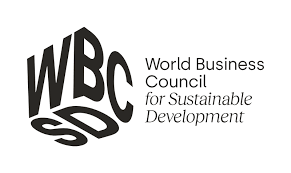
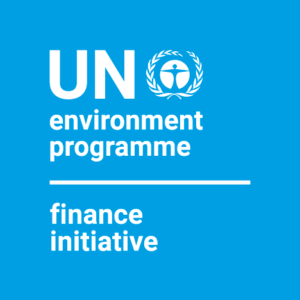





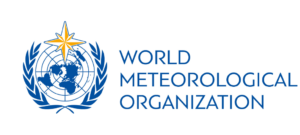


Updates
See all
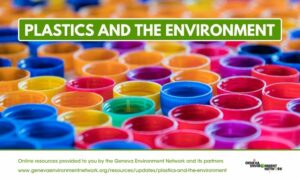
24 Apr 2024
Plastics and the Environment

26 Apr 2024
Towards Plastics Pollution INC-4



17 Apr 2024
